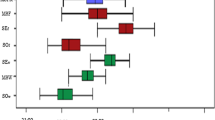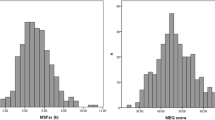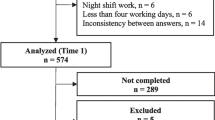Abstract
The purposes of this study were to investigate the validity and reliability of the Japanese version of Horne and Östberg’s Morningness-Eveningness Questionnaire (MEQ) and the characteristics of chronotype using other questionnaires and wrist actigraphy in healthy young subjects. The participants were 102 university student volunteers. The participants were instructed to continue normal life activities and habitual sleep-wake rhythms without extraordinary events for a study period of eight consecutive days, including 7 nights. Actual sleep-wake patterns were recorded by wrist actigraphy. The participants completed four questionnaires: MEQ, Epworth Sleepiness Scale (ESS), Pittsburgh Sleep Quality Index (PSQI), and Center for Epidemiologic Studies Depression Scale (CES-D). From the actigraphy data, sleep parameters such as bedtime, waketime, midtime, time in bed, sleep onset latency, wake episodes, wake after sleep onset, total sleep time, and sleep efficiency were derived. Cronbach’s α coefficient for internal consistency of the total MEQ score was 0.815, indicating high reliability. One-way analyses of variance showed that there were significant differences among the three chronotypes for bedtime, waketime, midtime, ESS, PSQI, and CES-D. Pearson’s correlation coefficients revealed that there were moderate negative correlations between MEQ scores and bedtime, waketime, and midtime, and that there were weak negative correlations between MEQ scores and ESS scores, PSQI scores, and CES-D scores. The results of this study demonstrated the validity and reliability of the Japanese version of the MEQ. In addition, the findings of this study showed that evening chronotypes were associated with greater daytime sleepiness, poorer sleep quality, and a depressive tendency.
Similar content being viewed by others
References
Rhee MK, Lee HJ, Rex KM, Kripke DF. Evaluation of two circadian rhythm questionnaires for screening for the delayed sleep phase disorder. Psychiatry Investig. 2012; 9: 236–244.
Roenneberg T, Kuehnle T, Juda M et al. Epidemiology of the human circadian clock. Sleep Med. Rev. 2007; 11: 429–438.
Lucassen EA, Zhao X, Rother KI et al. Evening chronotype is associated with changes in eating behavior, more sleep apnea, and increased stress hormones in short sleeping obese individuals. PLoS ONE 2013; 8: e565–719.
Martin JS, Hebert M, Ledoux E, Gaudreault M, Laberge L. Relationship of chronotype to sleep, light exposure, and work-related fatigue in student workers. Chronobiol. Int. 2012; 29: 295–304.
Toffol E, Merikanto I, Lahti T, Luoto R, Heikinheimo O, Partonen T. Evidence for a relationship between chronotype and reproductive function in women. Chronobiol. Int. 2013; 30: 756–765.
Horne JA, Östberg O. A self-assessment questionnaire to determine morningness-eveningness in human circadian rhythms. Int. J. Chronobiol. 1976; 4: 97–110.
Thun E, Bjorvatn B, Osland T et al. An actigraphic validation study of seven morningness-eveningness inventories. Eur. Psychol. 2012; 17: 222–230.
Li S-x, Li Q-q, Wang X-f et al. Preliminary test for the Chinese version of the Morningness-Eveningness Questionnaire. Sleep Biol. Rhythms 2011; 9: 19–23.
Griefahn B, Künemund C, Bröde P, Mehnert P. Zur Validität der deutschen Übersetzung des Morningness-Eveningness-Questionnaires von Horne und Östberg. Somnologie 2001; 5: 71–80.
Taillard J, Philip P, Chastang JF, Bioulac B. Validation of Horne and Östberg morningness-eveningness questionnaire in a middle-aged population of French workers. J. Biol. Rhythms 2004; 19: 76–86.
Benedito-Silva AA, Menna-Barreto L, Alam MF et al. Latitude and social habits as determinants of the distribution of morning and evening types in Brazil. Biol. Rhythm Res. 1998; 29: 591–597.
Adan A, Almirall H. Adaptation and standardization of a Spanish version of the morningness-eveningness questionnaire: individual differences. Pers. Individ. Dif. 1990; 11: 1123–1130.
Mecacci L, Zani A. Morningness-eveningness preferences and sleep-waking diary data of morning and evening types in student and worker samples. Ergonomics 1983; 26: 1147–1153.
Ishihara K, Saitoh T, Indue Y, Miyata YO. Validity of the Japanese version of the Morningness-Eveningness Questionnaire. Percept. Mot. Skills 1984; 59: 863–866.
Caci H, Deschaux O, Adan A, Natale V. Comparing three morningness scales: age and gender effects, structure and cut-off criteria. Sleep Med. 2009; 10: 240–245.
Pündük Z, Gür H, Ercan I. A reliability study of the Turkish version of the Morningness-Eveningness Questionnaire. Turk. J. Psychiatry 2005; 16: 40–45.
de Souza L, Benedito-Silva AA, Pires ML, Poyares D, Tufik S, Calil HM. Further validation of actigraphy for sleep studies. Sleep 2003; 26: 81–85.
Hyde M, O’Driscoll DM, Binette S et al. Validation of actigraphy for determining sleep and wake in children with sleep disordered breathing. J. Sleep Res. 2007; 16: 213–216.
Kushida CA, Chang A, Gadkary C, Guilleminault C, Carrillo O, Dement WC. Comparison of actigraphic, polysomnographic, and subjective assessment of sleep parameters in sleep-disordered patients. Sleep Med. 2001; 2: 389–396.
Lichstein KL, Stone KC, Donaldson J et al. Actigraphy validation with insomnia. Sleep 2006; 29: 232–239.
Morgenthaler T, Alessi C, Friedman L et al. Practice parameters for the use of actigraphy in the assessment of sleep and sleep disorders: an update for 2007. Sleep 2007; 30: 519–529.
Megdal SP, Schernhammer ES. Correlates for poor sleepers in a Los Angeles high school. Sleep Med. 2007; 9: 60–63.
Abe T, Inoue Y, Komada Y et al. Relation between morningness-eveningness score and depressive symptoms among patients with delayed sleep phase syndrome. Sleep Med. 2011; 12: 680–684.
Chelminski I, Ferraro FR, Petros TV, Plaud JJ. An analysis of the “eveningness-morningness” dimension in “depressive” college students. J. Affect. Disord. 1999; 52: 19–29.
Hidalgo MP, Caumo W, Posser M, Coccaro SB, Camozzato AL, Chaves ML. Relationship between depressive mood and chronotype in healthy subjects. Psychiatry Clin. Neurosci. 2009; 63: 283–290.
Gaspar-Barba E, Calati R, Cruz-Fuentes CS et al. Depressive symptomatology is influenced by chronotypes. J. Affect. Disord. 2009; 119: 100–106.
Kitamura S, Hida A, Watanabe M et al. Evening preference is related to the incidence of depressive states independent of sleep-wake conditions. Chronobiol. Int. 2010; 27: 1797–1812.
Natale V, Esposito MJ, Martoni M, Fabbri M. Validity of the reduced version of the Morningness-Eveningness Questionnaire. Sleep Biol. Rhythms 2006; 4: 72–74.
Tonetti L. Validity of the Morningness-Eveningness Questionnaire for Adolescents (MEQ-A). Sleep Hypn. 2007; 9: 47–51.
Johns MW. A new method for measuring daytime sleepiness: the Epworth sleepiness scale. Sleep 1991; 14: 540–545.
Takegami M, Suzukamo Y, Wakita T et al. Development of a Japanese version of the Epworth Sleepiness Scale (JESS) based on item response theory. Sleep Med. 2009; 10: 556–565.
Buysse DJ, Reynolds CF, 3rd, Monk TH, Berman SR, Kupfer DJ. The Pittsburgh Sleep Quality Index: a new instrument for psychiatric practice and research. Psychiatry Res. 1989; 28: 193–213.
Doi Y, Minowa M, Uchiyama M et al. Psychometric assessment of subjective sleep quality using the Japanese version of the Pittsburgh Sleep Quality Index (PSQI-J) in psychiatric disordered and control subjects. Psychiatry Research. 2000; 97: 165–172.
Radloff LS. The CES-D scale: a self-report depression scale for research in the general population. Appl. Psychol. Meas. 1977; 1: 385–401.
Wada K, Tanaka K, Theriault G et al. Validity of the Center for Epidemiologic Studies Depression Scale as a screening instrument of major depressive disorder among Japanese workers. Am. J. Ind. Med. 2007; 50: 8–12.
Cole J, Kripke DF, Gruen W, Mullaney DJ, Gillin JC. Automatic sleep/wake identification from wrist activity. Sleep 1992; 15: 461–469.
Cortina J. What is coefficient alpha? An examination of theory and applications. J. Appl. Psychol. 1993; 78: 98–104.
Streiner DL. Starting at the beginning: an introduction to coefficient alpha and internal consistency. J. Pers. Assess. 2013; 80: 99–103.
Author information
Authors and Affiliations
Corresponding author
Rights and permissions
About this article
Cite this article
Inomata, Y., Echizenya, M., Takeshima, M. et al. Validity and reliability of the Japanese version of the Morningness-Eveningness Questionnaire evaluated from actigraphy. Sleep Biol. Rhythms 12, 289–296 (2014). https://doi.org/10.1111/sbr.12073
Accepted:
Published:
Issue Date:
DOI: https://doi.org/10.1111/sbr.12073




